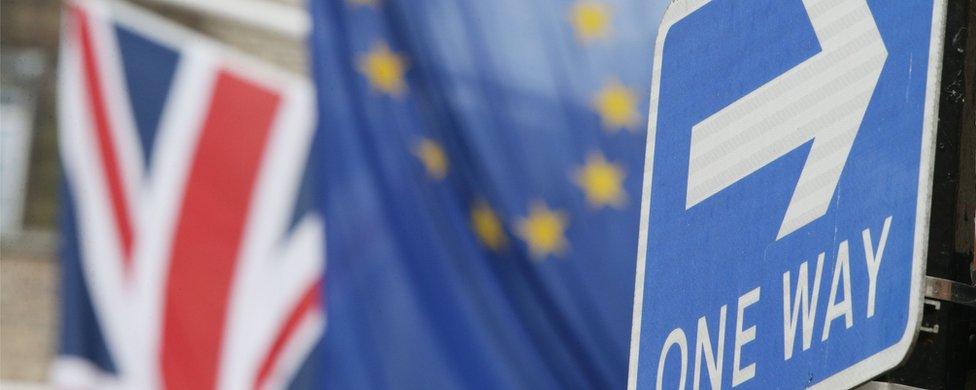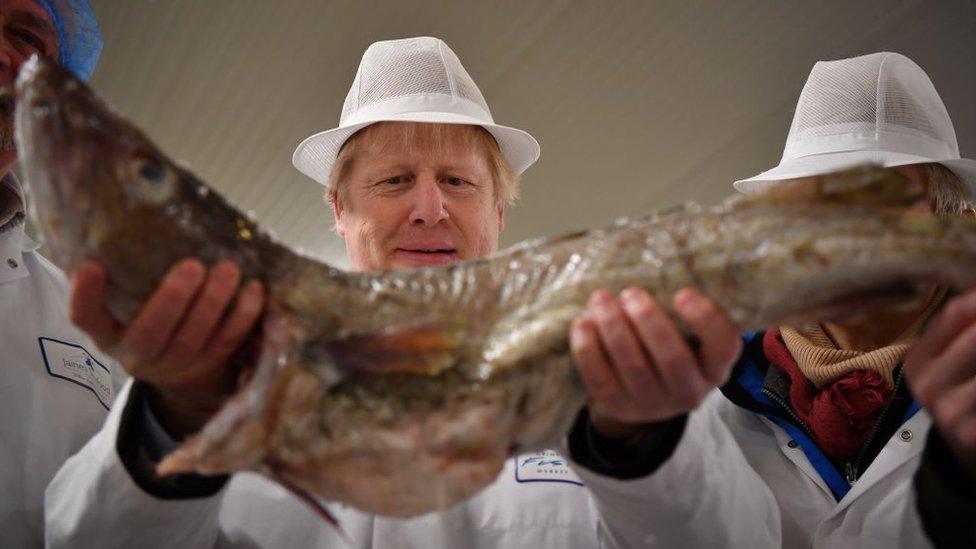Brexit: 'Prospect of breakthrough receding' in UK-EU talks
- Published
- comments

EU negotiator Michel Barnier has been in London since face-to-face talks resumed
The prospect of a breakthrough in post-Brexit trade negotiations between the UK and EU is "receding", according to a senior UK government source.
They told BBC political editor Laura Kuenssberg that the EU team were "bringing new elements into the negotiation" at the "eleventh hour".
But the source said a breakthrough was "still possible in the next few days".
Talks were continuing into the night in London. Current trading rules expire on 31 December.
Both sides are urgently seeking compromises in key areas, including fishing rights and competition rules.
An EU source told the BBC's political editor that talks were "extremely sluggish" around the so-called level playing field for competition rules and standards.
But another source from Brussels said there were "never any surprises or new demands from the EU side".
Laura Kuenssberg said both sides were suggesting to her that the real sticking point was over how those rules would be policed.
The UK and EU have been locked in talks since March to determine their future relations once the UK's Brexit transition period ends in less than four weeks' time.
The BBC's political editor said: "The stumbling blocks certainly aren't new, but the sense on the UK side is that talks have gone backwards 24 hours".
She added that there were "still real problems to solve".
Earlier, Ireland's foreign affairs minister Simon Coveney told Irish broadcaster RTE that talks were "at the very end".
Speaking ahead of Brexit meetings in Paris with his French counterpart on Thursday, he said efforts were under way to close negotiations "in the next few days".

Brexit - The basics

Brexit happened but rules didn't change at once: The UK left the European Union on 31 January 2020, but leaders needed time to negotiate a deal for life afterwards - they got 11 months.
Talks are happening: The UK and the EU have until 31 December 2020 to agree a trade deal as well as other things, such as fishing rights.
If there is no deal: Border checks and taxes will be introduced for goods travelling between the UK and the EU. But deal or no deal, we will still see changes.

Boris Johnson has said the UK remains "absolutely committed" to "getting a deal if we can".
Speaking on Wednesday, the prime minister said the EU side "know what the UK bottom line is," as talks continued in what is seen as a crucial week.
Face-to-face talks between negotiators have been ongoing since the weekend after a week-long pause.
The EU's chief negotiator, Michel Barnier, is expected to return to Brussels on Friday to brief the bloc on the state of play, but Laura Kuenssberg said he may come straight back to join the four new negotiators who arrived on Thursday night.


To do business with each other from January, the UK and the EU agree there will have to be some shared rules.
It's called the level playing field, if you want to use the jargon, and you can read about it in all the detail you want here.
But again and again, the two sides have clashed over who should be in charge of the rules and, particularly, what happens if things go wrong.
Late on Wednesday, there were signs that a deal was nearly concluded.
But after another day of talks on Thursday, just before 19:00 GMT, things seemed to take a turn for the worse.
It's true that both sides want a deal. It's also true that both sides can see the shape of a possible deal.
But when there is so much at stake, taking it for granted that it will happen is quite an assumption to make.

On Thursday, Labour leader Sir Keir Starmer told reporters: "If the choice is a deal or no deal, then a deal is obviously in the national interest."
He said he was "consulting across the Labour Party" on whether the party's MPs should back a deal if it comes to a vote in the Commons, and would decide after examining the contents of the deal.
He denied Labour was split over the issue, after reports he was planning to ask his MPs to vote in favour, external but some shadow cabinet members want to abstain.
"We've pulled together incredibly over the last few months through difficult decisions, and we'll do so on this decision again," he added.
The government has not confirmed how it intends to ratify a deal in Parliament.
But the UK's chief negotiator Lord David Frost has said he assumed MPs would have to approve a law to implement "at least some elements" of a deal.
Confused by Brexit jargon? Reality Check unpacks the basics.
The negotiations are continuing ahead of a politically sensitive moment next week, when a controversial piece of Brexit legislation returns to the Commons.
The Internal Market Bill, which would allow ministers to override sections of the UK's withdrawal agreement, will come back before MPs next Monday.
The publication of the bill in September sent shockwaves through the talks, and led to the EU Commission beginning legal proceedings against the UK.
But on Thursday, Commons leader Jacob Rees-Mogg said the government intends to reinsert contentious clauses taken out of the bill by the House of Lords.
The PM's spokesman added the bill was a "legal safety net" to protect the UK internal market, in case talks about detailed arrangements for the Irish border break down.
On Wednesday, MPs are also set to vote on a new taxation bill that will reportedly contain similar powers to override the withdrawal agreement over the issues of customs and VAT.
EU leaders are due to meet next Thursday in Brussels for a scheduled summit.
Related topics
- Published30 December 2020

- Published18 December 2020
